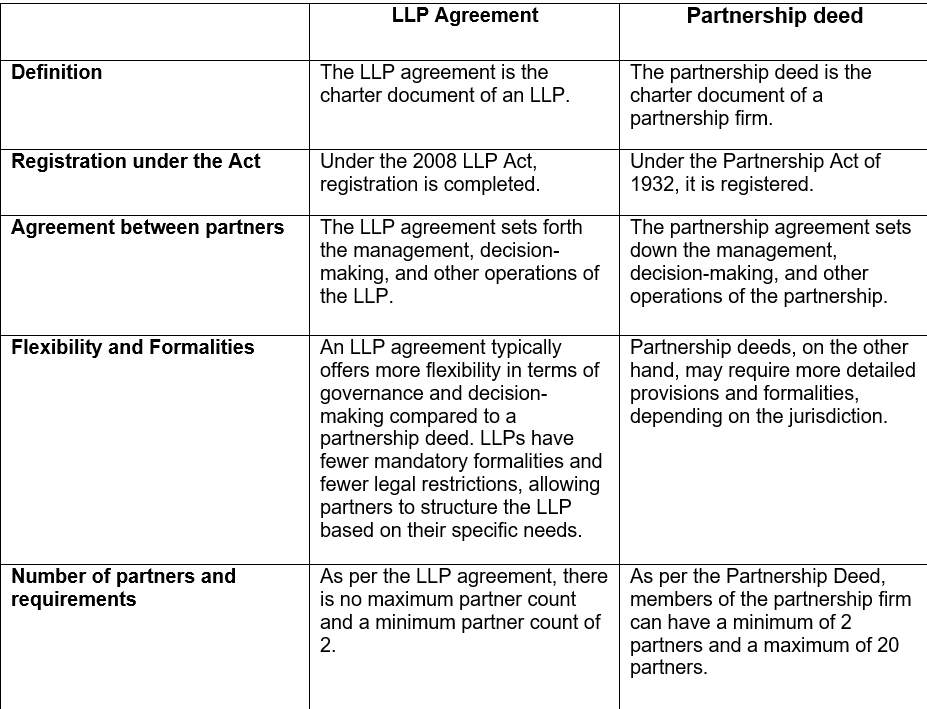Differences and Importance of an LLP Agreement vs. a Partnership Deed
Introduction
An LLP agreement governs and operates a limited liability partnership, whereas a partnership deed governs and operates a general partnership. While a partnership deed and an LLP agreement both govern how a partnership operates, they differ in terms of liability protection, legal requirements, control and ownership, termination and dissolution, and legal standing. The primary distinction between a partnership deed and an LLP agreement is the type of structure involved.
What exactly is an LLP agreement?
An LLP (limited liability partnership) is a written instrument that defines the agreement between the Limited Liability Partnership‘s partners. It defines all partners’ roles and responsibilities to one another and to the firm. The LLP agreement specifies profit sharing, new member admittance, management and decision-making, retirement, and withdrawal from the LLP. It also specifies the rights and obligations of departing members.
What exactly is a partnership agreement?
A partnership deed, also known as a partnership agreement, is a written and legal agreement between the firm’s existing members that defines the partnership’s terms and conditions. Typically, company partners do this to avoid disagreements and problems when profit sharing or leaving the organization.
The distinction between an LLP agreement and a partnership agreement
The following are some important distinctions between an LLP agreement and a partnership agreement:

The significance of a partnership agreement
The partnership deed is critical in a partnership for various reasons:
- Clarity and Understanding: A partnership deed is a legally enforceable document that explains each partner’s rights, responsibilities, and obligations. It aids in the clarification and understanding of partners’ roles, profit sharing, decision-making procedures, and contributions.
- Dispute Resolution: In the absence of a partnership agreement, disagreements and conflicts between partners may emerge, leading to disputes. A well-drafted partnership agreement might include dispute resolution processes such as arbitration or mediation, reducing disagreements and promoting easier corporate operations.
- Asset Protection: Provisions in the partnership agreement might address the protection and distribution of partnership assets. It explains the process of adding or removing partners, managing partnership property, and addressing partner withdrawal or retirement difficulties. This helps to protect the partnership’s assets and ensures that partners are treated fairly.
- Legal Protection: A partnership agreement protects the rights and interests of the partners. It creates the partnership as a separate legal entity and offers a structure for dealing with legal issues. It aids in enforcing the partnership’s conditions and can be used as evidence in the event of a legal dispute.
Importance of an LLP Agreement
- Legal Recognition: An LLP agreement is a legally binding instrument that specifies the LLP’s and its partners’ rights, duties, and obligations. It establishes the LLP as a separate legal entity from its partners.
- Limited Liability Protection: One of the most significant benefits of an LLP is the limited liability protection it provides to its partners. The LLP agreement explicitly defines each partner’s level of liability, ensuring that their personal assets are secured in the event of any legal claims or financial obligations owed by the LLP.
- Legal Compliance: The LLP agreement assures that the LLP operates in accordance with all applicable laws and regulations. It may include measures for keeping accurate books of accounts, filing annual returns, complying with tax duties, and adhering to other legal requirements. This helps to prevent penalties and legal troubles.
- Intellectual Property Protection: The LLP agreement might handle the LLP’s intellectual property ownership, usage, and protection. It protects the LLP’s intangible assets, such as trademarks, copyrights, or patents, by clearly specifying partners’ intellectual property rights and responsibilities.
Conclusion:
A partnership deed and an LLP agreement are both essential for any business with two or more partners to ensure that their operations run smoothly and without interruption throughout the life of the business. Both phrases are distinct, although both are important in the business world.